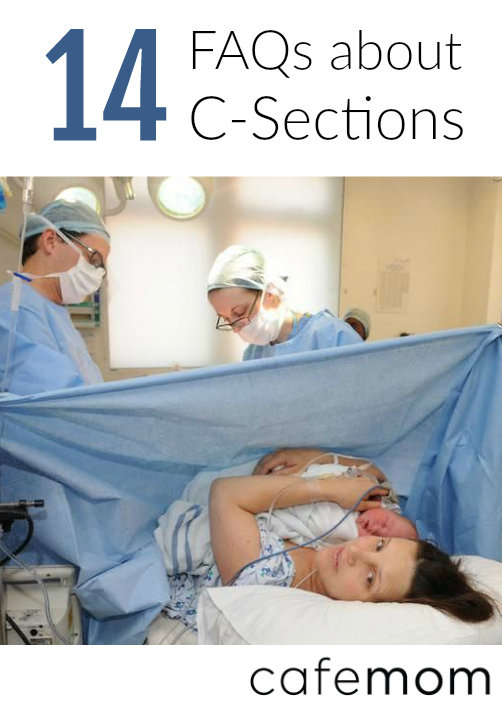Whether you're going into your birth already knowing you're having a C-section or you have every intention of having a vaginal birth, it's smart to talk to your doctor about what to expect in the event that you do have to have a cesearan. This is especially important since about 32 percent of all deliveries today are via C-section (and not all are planned).
You may not think so now, but there is a chance that you will wind up on an operating table the day you welcome your beautiful baby into this world. One 15-minute discussion can prevent you from winding up in a position where you feel completely helpless, overwhelmed, and in the dark as to what's happening to you.
Here, some questions to consider asking your doctor before you give birth.
1. Who can be in the operating room with me? Planning on having your husband, doula, BFF, and a professional photog with you when you give birth? That might not be possible if you're having a c-section. Hospital policies vary, but more than two people are almost never permitted in the OR. "Typically, most places only allow one person in the operating room, some maybe allow two, usually a husband and a doula," says Daniel Roshan, M.D., an OBGYN specializing in high-risk pregnancies in New York City. If having more than one person in the room with you during surgery is important, discuss it with your doctor as soon as possible.
2. What kind of anesthesia will I have? You're obviously going to have to let go of the dream of having a drug-free birth. An epidural is the most commonly used medication during a C-section (yes, just like the one most women have during vaginal births), but another option is a spinal block. With an epidural, a catheter is placed in your back and you'll be given medication as needed. A spinal, on the other hand, is a one-time injection that kicks in quickly, but only lasts a few hours. La Leche League suggests opting for an epidural if you have a choice, as it will leave you more lucid post-surgery, and more likely to nurse right away, which can increase breastfeeding success. But if you have a spinal, don't worry, you're not doomed to be a breastfeeding "failure." Discussing your options with your doctor before surgery will help you make the best, and most helpful, decision for your situation.
3. What are the risks of a C-section? Celebrities who are "too posh to push" may have given the impression that C-sections are a walk in the park, but the fact is, they're major surgery. "It requires anesthesia, and anesthesia of any kind has complications of its own," says Dr. Roshan. It's uncommon, but some women have complained of extreme headaches in the days following an epidural or spinal block. Other risks that come with a C-section may include: blood clots, excessive blood loss, infections, depression.
4. What are the risks of a C-section to my baby? If your due date wasn't calculated correctly and you have a scheduled C-section, your baby could be delivered early. Premature babies may have more health problems than those delivered full-term__.__ Babies delivered via C-section are more prone to breathing and respiratory problems, and may have lower APGAR scores.
More from CafeMom: 21 Things Not to Do After a C-Section
5. How long will it take? The surgery usually lasts between 45 minutes and an hour, but for a planned C-section, your doctor may want you at the hospital hours before the actual surgery begins. It's good to know how much waiting-around time to plan on, and whether or not you can have anyone with you during that time (your other children, friends, family members, even a "pre-surgery" doula).
6. Will I be shaved before surgery? Shaving the pubic area is almost always part of the surgery prep before a C-section, because it gives doctors a clean area to make an incision. Ask your doctor what her policy is as early as possible — the fewer surprises on the day of your surgery, the better. And taking care of the job at home might just feel more comfortable.
7. Will I be strapped down? Some doctors do strap down their patients' arms, and if yours is one, you'll want to find out ahead of time so you can talk it out if that's not something you're comfortable with.
8. What's the recovery time? Most C-section patients are released from the hospital after 3 days. This is important to know because if you are going in for a natural birth and end up having an emergency c-section, you might have to line up childcare. Once you get home, recovery time varies. Your doctor will likely limit your activity (usually for around 2 weeks) so you should expect to need help once you get home. If you don't have family or friends who can pitch in, now is a good time to suss out professional caregivers should you have to hire someone. Most women are completely "back to normal" between 6 and 8 weeks.
9. Can I eat before surgery? Most doctors will tell you not to eat or drink 8 hours prior to a scheduled C-section, as food in the digestive tract could cause complications, or can make you nauseated or even vomit. But you should find out and follow your doctor's pre-surgery eating rules. If you weren't planning on a C-section and ate within 8 hours, it's very unlikely that there will be dire effects, but let your doctor know.
More from CafeMom: 15 Breathtaking Images of Childbirth in All Its Raw, Beautiful Glory
10. Where will my incision be? Just because your friend has a vertical C-section scar in the middle of her abdomen doesn't mean you will too. There are three types of incisions — low transverse, which are the most common; classical, which are typically for a quick delivery or pregnancies with complications; and low vertical, which may be used if baby is in an awkward position. Your doctor might not know for sure before surgery, but she may have a better idea which is likely the further along you are in your pregnancy.
11. How is my wound going to be closed up? Depending on your skin, medical history, and doctor's normal practices, she likely will close your wound up with either dissolvable stitches or staples, which would be removed before you leave the hospital. (Both your skin and uterus will be stitched post-surgery.)
12. Can I hold my baby in the OR? Because every hospital has its own policies, it's imperative that you discuss this with your doctor as early as possible if you want to hold your baby. Skin-to-skin contact between moms and babies directly following birth has many benefits, including an increased likelihood of breastfeeding success. Barring any complications from surgery, most hospitals will let you hold your baby as soon as you've been stitched up. Note: It might not be a bad idea to reiterate your wishes on the day of surgery.
13. What will you do to ensure that breastfeeding is as easy as possible for me post-surgery? For a variety of reasons, you might have more difficulty nursing your baby if you had a C-section than if you gave birth vaginally. The key is letting your doctor (and nurses) know that you're committed to breastfeeding. Many hospitals have lactation consultants on staff, as well as breastfeeding classes. Knowing what kind of support team is in place before you give birth can alleviate a lot of stress, should you run into problems trying to breastfeed.
14. What resources will be available to me at the hospital if I feel depressed post-surgery? Some women report having a "negative birth experience" after they've undergone a C-section (particularly if it wasn't planned). Find out exactly who to ask for at the hospital should you feel depressed after your C-section (there likely will be therapists on staff).





